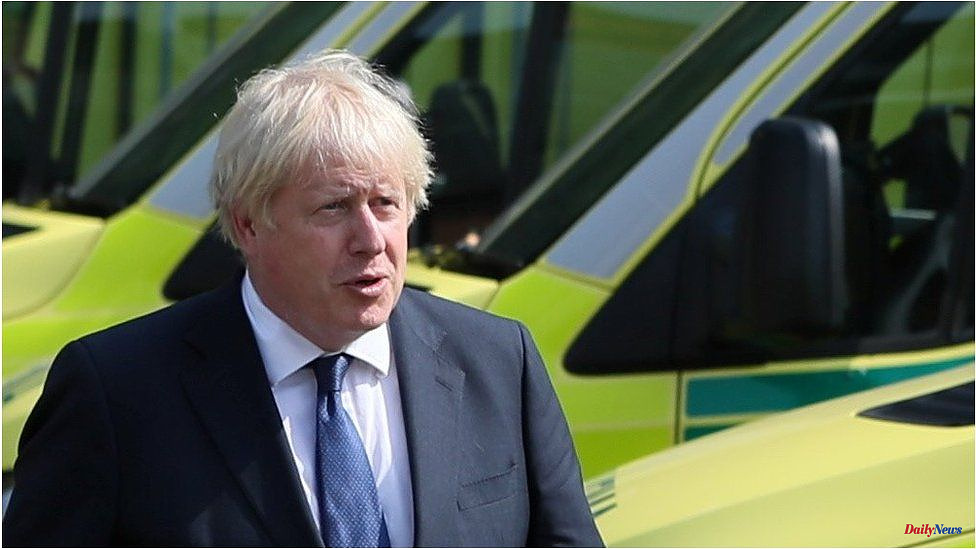Foreign Secretary Liz Truss announced plans to "fix” the Northern Ireland Protocol - the Brexit deal that the prime minister negotiated.
Boris Johnson visited Northern Ireland Monday to meet with the DUP, who had refused to join the new government due the protocol.
It was put into effect in January 2021. This law was designed to prevent checks on goods between NI (the Irish Republic) and the European Union (a border between the UK & the European Union).
It has also meant that goods entering NI from the UK have been checked - something Mr Johnson and the DUP object to.
We have looked at the statements of Ms Truss and other government officials about the protocol.
In March, Rishi Sunak, the Chancellor, announced that he would eliminate VAT on domestic solar panels and insulation, but not immediately be able "to apply it to Northern Ireland".
This is because NI adheres to the EU's VAT rules - which have a minimum rate at 5% (unless certain items have been exempted – something it is currently planning to do with "green" products like solar panels).
Protocol text made it clear that NI would need to comply with these rules.
It stated that VAT was covered by the following: "The provisions [European] Union law concerning goods listed in Annex 3 of this protocol shall apply to and within the United Kingdom with respect to Northern Ireland."
The protocol states that the UK government will collect the EU-set VAT rate in NI.
In the case of Ms Truss, money equal to Mr Sunak's amount will be given to Northern Ireland government.
This protocol states that Northern Ireland is still bound by EU rules regarding medicines, but the majority of its medicines are imported from Great Britain.
Concerns were raised when the Department of Health in NI was informed that 910 medicines were to be withdrawn by medical companies because they said it would be too costly to comply with EU rules.
The EU recognized the problem and in April the European Council passed the following changes:
Edward Argar, the Health Minister, welcomed the changes in May. He stated: "We believe that the EU legislation addresses some of the urgent and immediate supply issues."
The EU's Diagnostic Medical Devices Regulation, which will be in force on 26 May, is another potential problem. This would mean that Northern Ireland must follow EU laws regarding Covid testing, and not British.
UK in a Change Europe, an organization that focuses on UK-EU relations has conducted regular online polls with over 12,000 people in Northern Ireland.
43% of respondents considered the Northern Ireland Protocol "a good thing" in March 2021. 44% disapproved.
The latest poll from October 2021 showed that public opinion had changed: 52% agreed that the protocol was "a good thing", while 41% disagreed.
Queen's University Belfast conducted another poll in February 2022. Half of those who participated had a positive opinion of the protocol. 41% disagreed.
According to the latest poll by the Northern Ireland Chamber of Commerce, 55% of businesses claimed that Brexit has increased their business costs. 43% stated that the Protocol has increased their costs.
Despite Boris Johnson's claim of "no checks” in 2019, the protocol stated clearly that there would be a variety of bureaucratic steps that affect GB-NI trade. These include customs declarations and food safety checks.
According to the Department of Agriculture, Environment and Rural Affairs, (DAERA), between January 2021 and March 2022, some type of inspections (either physical or on paper) was carried out at NI ports.
This was despite several grace periods - where the implementation of EU rules was temporarily suspended in order to allow businesses to adjust to the new trading system.
Some people have complained - the Consumer Council's June 2021 research found that 200 online sellers in GB had stopped shipping to NI.
It is not clear how the protocol has affected global trade. The latest official figures for trading between GB & NI were released in 2020 - prior to the protocol's implementation.
The European Commission vice president, Liz Truss, responded to Liz Truss’s speech by highlighting the proposals it made last Oct.
These would allow goods to be moved quickly from GB into NI, according to the EC. They would also reduce spot-checks for food products by 80% and cut down on customs paperwork by 50%.
It stated that the UK would have to construct properly-equipped border posts at Northern Ireland ports to allow access to real-time trade data, and implement labelling "only for sale within the UK".
There has been some doubt about whether such checks could be cut.
Catherine Barnard, Professor of European Law at University of Cambridge, stated that "our feeling is that this was an overestimate of reductions that would occur."
Liz Truss stated to MPs that the Commission's current proposals were "unable to address fundamental concerns".
Which claims would you like BBC Reality Check investigate? Get in touch
Reality Check has more information












